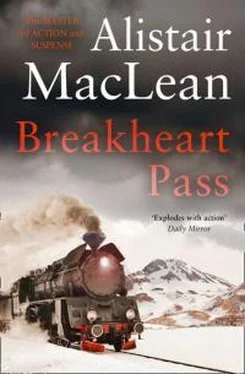Shaken, but still going concerns, Pearce, O’Brien and White Hand scrambled to their feet. With the three men lining their guns on him Deakin seemed momentarily paralysed, then dived for safety without a shot being fired. Shock had slowed the reactions of the men with the Winchesters.
Fairchild, Claremont and Marica flung themselves flat as the three men advanced, their Winchesters cocked. Deakin thrust his hand under his coat. It came out slowly, empty. His gun was in the Commandant’s room. The three men were now less than fifteen yards distant from him, rounding the outcrop: it was obvious that Deakin had no gun. But in his right hand he held an already ignited tube of blasting powder. He waited for what seemed a dangerously long period, then threw it over the outcrop.
The charge exploded over the three men, momentarily blinding them and throwing them off-balance. Deakin ran round the corner of the outcrop. There was much smoke and dust but he could see that White Hand, his hands clutched to his streaming eyes, had lost his rifle. Two seconds later it was in Deakin’s hands, lined up on the still slightly dazed Pearce and O’Brien.
Deakin said: ‘ Don’t do it. Don’t make me make history. Don’t make me the first man in history to kill another with a Winchester repeater.’
Pearce, who had recovered the most quickly of the three, hurled himself to one side, bringing up his repeater. Deakin’s gun boomed.
Deakin said: ‘I think that’s enough history for one day.’
O’Brien nodded and threw down his gun. His tear-filled eyes could barely see.
The three of them were joined by Fairchild, Marica and Claremont, the last with a very steady gun in his wounded hand. Deakin, Fairchild and Marica stood a little apart close to the edge of the shattered bridge, gazing downwards. Far below in the depths of the ravine lay the crumpled, broken remains of the train with the locomotive lying on top of the crushed coaches. There was no movement to be seen, no sign of life.
Deakin said heavily: ‘An eye for an eye. Well, I suppose we have the ones who matter – O’Brien, Calhoun and White Hand.’
Fairchild was sombre. ‘All except one.’
Deakin looked at him. ‘You – you know about your brother?’
‘I always suspected. I never knew. He – he was the ringleader?’
‘O’Brien was. O’Brien used him, used his greed and his weakness.’
‘And all his ambition, all his greed, ends in the bottom of a ravine.’
‘For him, for you, for your daughter – the best way.’
‘And now?’
‘One detachment of your men to bring back the horses I abandoned down the line. Another to repair the telegraph line. Then we call up a train-load of army and civil engineers to rebuild this bridge.’
Marica said: ‘And you’ll be returning to Reese City now?’
‘I’ll be going back to Reese City when that bridge is repaired and a train has crossed it to load all the bullion in Fort Humboldt. I’ll let that gold and silver out of my sight when it’s reached Washington. But not before.’
Fairchild said: ‘But it’ll take weeks to repair that bridge.’
‘Like enough.’
Marica smiled. ‘It looks like being a long hard winter.’
Deakin smiled in return. ‘Oh, I don’t know. I dare say we’ll find something to talk about.’
Конец ознакомительного отрывка
Купить книгу








